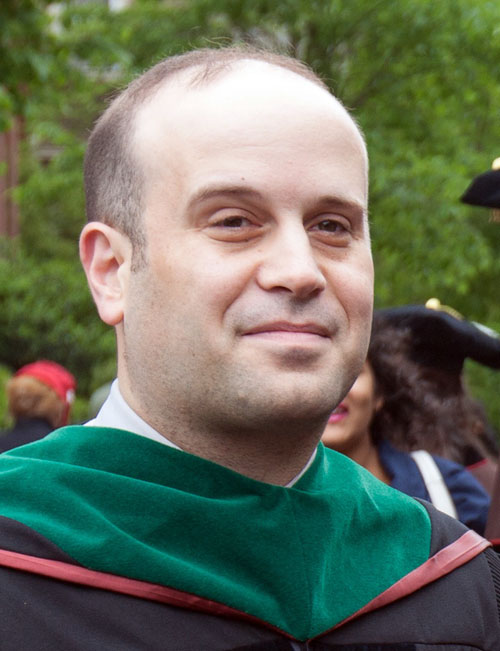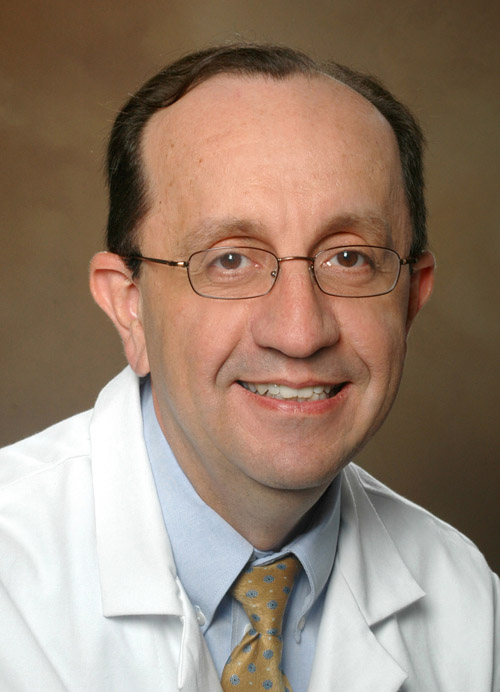PROVIDENCE, R.I. [Brown University] — Two closely related three-year grants — one to Brown University and one to Rhode Island Hospital — will integrate extensive training in substance abuse screening and intervention into the curriculum not only for medical students and residents but also for students in social work, nursing, and pharmacy. Because all these trainees already help to provide health care to thousands of Rhode Islanders, the programs will substantially expand the amount of screening and intervention around the state as it seeks to overcome a major epidemic of opioid overdose deaths.
The grants of $916,851 to Brown and $788,403 to Rhode Island Hospital come from the U.S. Substance Abuse and Mental Health Services Administration (SAMHSA). At Brown, Dr. Paul George is developing training for medical students in all four years of instruction at the Alpert Medical School, and is collaborating with Rhode Island College to create curriculum for nursing and social work students and the University of Rhode Island for pharmacy students. At Rhode Island Hospital Dr. Michael Mello will produce a training program and curriculum for fourth-year medical students and residents in emergency medicine.
It’s an urgent matter.
“Opiate overdoses have surpassed motor vehicle crashes as being the leading cause of unintentional injury death in Rhode Islanders, and alcohol misuse continues to contribute to our burden of injury and illness,” said Mello, professor of emergency medicine and director of the injury prevention center at Rhode Island Hospital.
Addiction medicine has long been a part of the Alpert Medical School’s curriculum, but the rapid growth of the opioid epidemic requires the new training, said George, associate professor of family medicine.
“Deaths related to opioid overdose have risen dramatically in the last five to 10 years,” George said. “It’s something most physicians will see at some point in their career, regardless of what specialty they go into.”
So when SAMHSA put out a call last year for grants for medical and other health professional schools to train for screening and intervention, George and Mello each jumped on the opportunity.

“It’s something most physicians will see at some point in their career, regardless of what specialty they go into.”
The training, Mello said, is based on decades of research that have validated a model called SBIRT, or screening, brief intervention, and referral to treatment.
In SBIRT a doctor, nurse, pharmacist, social worker or other care giver asks the patient standardized questions to assess substance use. If a patient is engaging in risky behavior, the provider provides some feedback and advice. When patients need even more help, the provider gives them a referral to get it.
It will be on the test
George said the curriculum for medical students will stretch from year one to residency. First-year students will get introductory lectures on pain management — many opioid addictions begin with prescribed pain drugs.
In April, first-year students will also team up with social work, nursing, and pharmacy students in workshops where they all work together to screen and intervene “standardized patients” who are actors. They’ll also hear from people who have had real experiences with opioid addiction, and they’ll learn how to administer naloxone, the drug that prevents overdose deaths.
In later years medical students will work on case studies in class and will employ SBIRT with at least five patients during each of their yearly doctoring courses and in some of their clerkships. Nursing, pharmacy, and social work students will also apply SBIRT in their educational work with community members.
“When we wrote our grant we projected that we would screen approximately 30,000 Rhode Islanders for substance abuse disorders and probably provide a brief intervention and referral for treatment for about a third of those,” George said.
For medical students, demonstrating competency with SBIRT will become a graduation requirement. It will be part of the Objective Structured Clinical Examination that students must take in their fourth year.
Screening in the ED
The Emergency Department setting is particularly crucial for the training, Mello said.

“Opiate overdoses have surpassed motor vehicle crashes as being the leading cause of unintentional injury death in Rhode Islanders.”
Image courtesy Lifespan
“Epidemiological data has shown that the population that comes to emergency departments has higher rate of substance abuse than the general community so it is a very important skill for providers working in emergency departments to have,” Mello said.
The Rhode Island Hospital grant will therefore focus on teaching residents and students who rotate through the Emergency Department to integrate SBIRT into routine clinical care. They’ll use the hospital’s simulation center and will work with real patients under the supervision of attending there. Students and residents will get feedback on the spot and in weekly conferences.
Part of the grant, Mello added, will fund training for attending physicians in supervising and evaluating the SBIRT practices of residents and students.
Since the grants first began in October, many curricular materials, such as case studies, have been developed for SBRIT training. Implementation in the classroom, doctor’s offices, workshops and emergency department will begin in spring semester 2016.
But Mello and George noted that the curriculum won’t stop when the grants do in 2018.
“Nothing will change once the grants end,” Mello said. “This will be part of the medical school curriculum going forward.”

